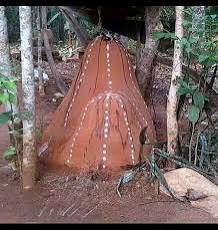In the heart of Igbo land, a revered spiritual deity has been worshipped for centuries, playing a vital role in the lives of its adherents. Aja Ani, also known as Nne Ala (Mother Sand), is a female spiritual deity deeply connected to the earth, morality, fertility, and creativity. This intricate deity is comprised of three distinct parts: Aja Ana Ngwuru (father's compound spirit), Aja Ana Mbara (village spirit), and Aja Ana Obodo (town spirit).
At the helm of Aja Ani's spiritual hierarchy is the Chief Priest, chosen by the deity itself to wield the sacred ofo. This spiritual leader is not necessarily a family member or a prominent figure in the community, but rather an individual selected by Aja Ani to serve as its earthly representative.
Aja Ani's significance extends far beyond its spiritual realm, as it is believed to protect family members, villagers, and townspeople from harm, sudden death, and misfortune. Adherents of this ancient religion believe that Aja Ani's benevolence brings prosperity and success to those who seek its guidance and protection.
The deity's shrine serves as a sacred space where sacrifices, appeasements, and solicitations for protection are offered by the faithful. These rituals involve the slaughter of animals, the pouring of libations, and the presentation of food offerings. The meat from these sacrifices is then shared among the believers, while specific parts are reserved for the elders and the shrine itself.
The initiation of a chosen Chief Priest is a mystical and secretive process, involving occultic practices that include blood drinking, sacrifices, and bodily inscriptions. This esoteric ritual serves to consecrate the initiate as a vessel for Aja Ani's divine will.
However, the fervor and devotion of Aja Ani's adherents can sometimes manifest as fanaticism. Those who refuse to comply with the deity's doctrine or reject its teachings are often viewed as outcasts and betrayers, facing varying degrees of harm and grievous consequences.
As we delve into the mysteries of Aja Ani and Igbo Traditional Religion, it becomes clear that this ancient faith has been transformed over time. What was once a peaceful and morally upright tradition has, in some cases, given way to a more radical and exclusionary practice. As we navigate the complexities of this spiritual landscape, we are reminded of the importance of understanding and respecting the diverse traditions that shape our world.
The significance of Aja Ani in Igbo culture cannot be overstated. The deity represents the very fabric of Igbo society, embodying the values of fertility, morality, and creativity. Aja Ani's role in Igbo traditional religion is multifaceted, serving as a symbol of protection, guidance, and prosperity.
In Igbo mythology, Aja Ani is often depicted as a powerful and benevolent deity, who watches over her people with kindness and compassion. Her shrine is a sacred space, where the faithful come to seek her guidance, protection, and blessings.
The role of the Chief Priest in Aja Ani worship is equally significant. This spiritual leader serves as the earthly representative of the deity, responsible for performing rituals and sacrifices on behalf of the faithful. The Chief Priest is also responsible for interpreting the deity's will, providing guidance and counsel to the community.
However, the impact of fanaticism on Aja Ani adherents is a growing concern. The exclusionary and sometimes harmful practices within the tradition have led to concerns about the well-being and safety of those who refuse to comply with the deity's doctrine.
For anyone who seeks to understand the complexities of Aja Ani and Igbo Traditional Religion, it is essential to approach it with sensitivity and respect. This will help gain a deeper appreciation of the cultural heritage of the Igbo.
Nnamdi Okafor is a writer from Ogidi, Idemmili North, Anambra State.
